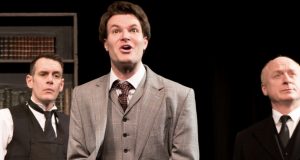REVIEW: The Diary of a Nobody by G & W Grossmith, adapted by Hugh Osborne
Written by the Grossman brothers in the 1880s, “The Diary of a Nobody” is a set of humorous memoirs by somebodies about the less exciting life of a nobody. In 2011, the story was adapted for the stage by Hugh Osborne and performed in the style of “The 39 Steps” and “Jeeves and Wooster”, with minimal staging and a cast playing multiple roles.
Before the curtain rose, Victorian theatrical splendour was in evidence. Magnificent decorations to the proscenium arch, enhanced with period looking working footlights, were a credit to set builders and technical crew alike.
First on stage, and rarely off-stage, was Duncan Brown as Mr Pooter, our eponymous heroic nobody, a self-acknowledged small man in a small life. A man who enjoyed a good laugh at his own jokes, which was just as well, for apart from his family, no one else found them funny. Julie Tucker-Williams (Mr Darwitts), Bertie Hustwayte (Mr Birks–Spooner) and Rich Keeble (Mr Hillbutter) played the range of characters from Pooter’s diaries. An uncluttered stage provided them with generous acting space for Pooter’s series of often socially embarrassing mishaps and misadventures.
The cast performed with tremendous energy and gave superb performances, driving the production forward at relentless pace. Their performances outshone the quality of the play itself; at times the script seemed weak and without the strength of their characterisation and skilled delivery our interest in the story may have waned. For me, the finest moments were Pooter’s arrival at a reception with Darwitt swiftly changing location and character whilst deftly masked by the roaming Birks-Spooner, use of a screen during a party to hide slick costume and prop changes and Hillbutter’s simultaneous word-for-word exchange with Pooter. Bertie Hustwayte’s portrayal of Pooter’s son, Lupin, was an especially strong characterisation. A delight also, was Pooter’s enthusiasm for his holiday in Broadstairs, brought to life with black and white projections, and in contrast to his lonely job, where in a cold spotlight, he reported to the manager, Mr Perkupp, cleverly voiced by Terrence Hattemore.
Costumes were effective, particularly use of small apron bags which aided quick changes. Piano accompaniment from Robert Connelly (Mr Putley) in the form of period music and original compositions, added significantly to the atmosphere of the piece.
Rob Hustwayte’s debut as a Stables’ director had wrung every ounce of humour and story-telling from the play in a tight, fun and creative production.
Andrew White













